Belgium - Australia on an BMW R1100 GS motorcycle, solo.
Report #12 - September 14th to October 3rd, 1998...
In Turkey I tried to form a picture of Iran. I thought I would end up in a very orthodox religuous society, filled with rules and commandments which would be illogical and strange to me. Iran is officially called the 'Islam Republic Iran', and that shows.
There isn't a single woman without a scarf to cover her head. Many wear a 'chador', which covers head and shoulders, and reaches to the floor. It consists of a single piece of cloth, and is held with one hand. The other hand can be used to carry things like groceries, also under the cloth. When two hands are necessary, the chador is held with the teeth. Under the chador the ladies wear a sort of overcoat with shoulder pads which would belittle an American football player. This overcoat is to hide all feminin shapes. Many wear an additional head scarf under the chador as well, the heavy drapes catch a lot of wind, and sometimes this causes more exposure than is desired.
By the way, at some checkpoint they asked me what was in the watertight bags on the back of my bike. "A tent", I said, but they didn't understand me. I gestured it was a cloth thing to sleep in. "Chador!", the word was in Farsi...
The public life in Iran slows down on Thursdays, and comes to a full stop on Fridays. I'm surprised the feeling Sundays gives me in Europe is exactly alike, but then on Friday. The shops are closed, the churches are filled.
The public life as I see it is dominated by men more than in Turkey - I hardly see any women on the streets, apart from the hours at sundown. Many women (are allowed to ?) do their shopping.
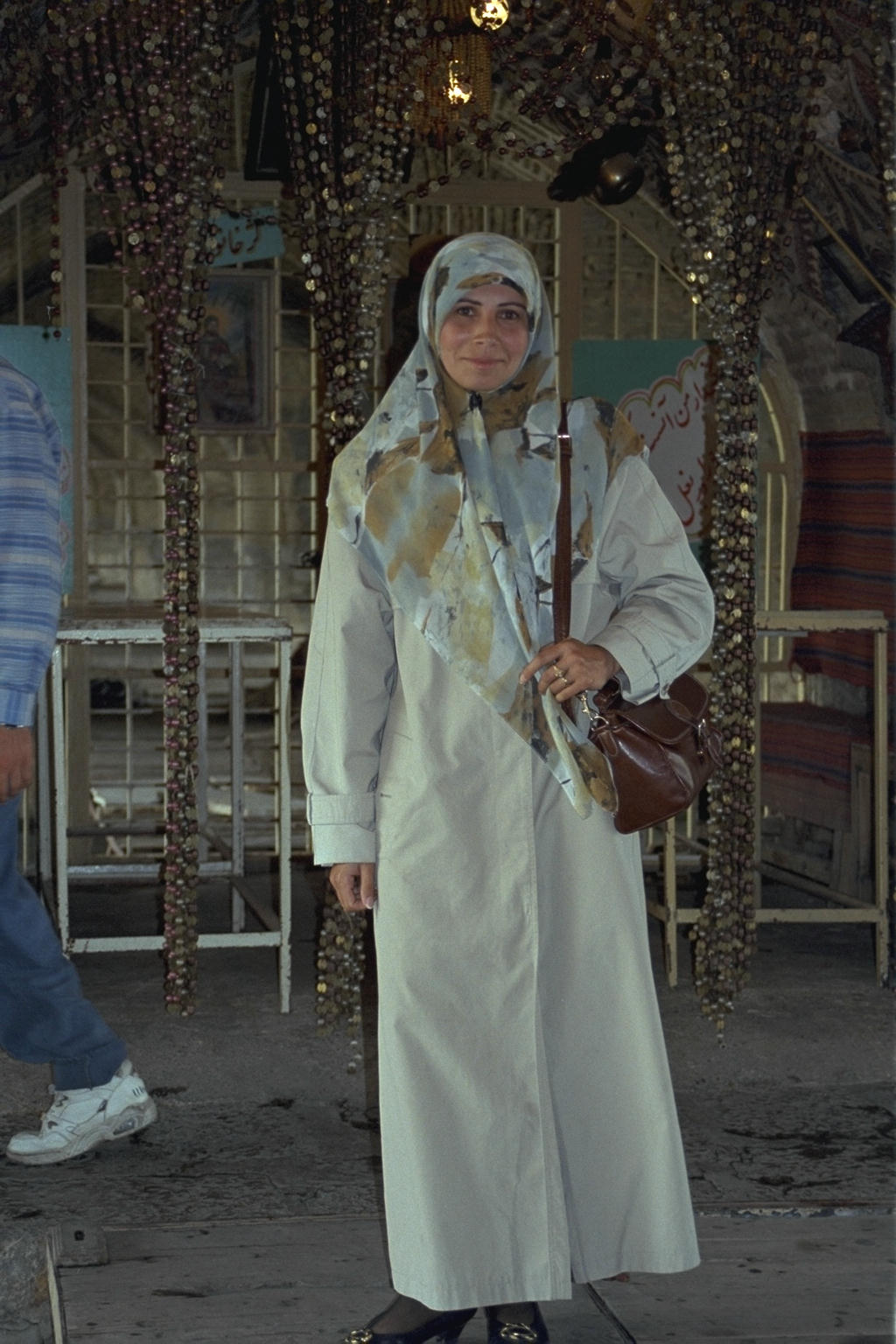
The veils which completely cover the face, like I've seen with the women from Saudi Arabia (the ones visiting Jordan) are absent here. The faces of Iranian women are uncovered. And they do things which I've heard are not allowed: many of the younger women are seeking eye contact with me! The first time I was a bit taken aback with the situation, but that didn't last long... I also see other colors of overcoats, chadors reaching 'just' to the shoulders, some of them with colorful patterns. Sometimes the Iranian men watch these modern women with a look of disapproval. I personally like the change, with half of the population indoors most of the time or dressed in a black tent life is less colorful.
After spending a few months in Islam countries I find the repression of women very bizarre. And Iran tops them all: whipping for the woman who shows her hair in public - although the executioner has to hold the Koran under his arm, so he can't really lash out at full strength. I don't really notice anything regarding these absurd punishment rules in the behavior of the people - they seem fairly at ease.
I miss music the most. According to the Islam it is blasphemy to get intoxicated by alcohol, drugs or... music! I knew music is capable of changing your mood, but to put drugs and music at the same level seems a bit overdone. Anyway: every restaurant is engulfed in silence, every meal is without wine. No wonder the cuisine lacks a great diversity, and the Iranians usually eat at home.
In some places in the Western world the constant music can be annoying (clothing boutiques, elevators), but to be completely without music is too bare.
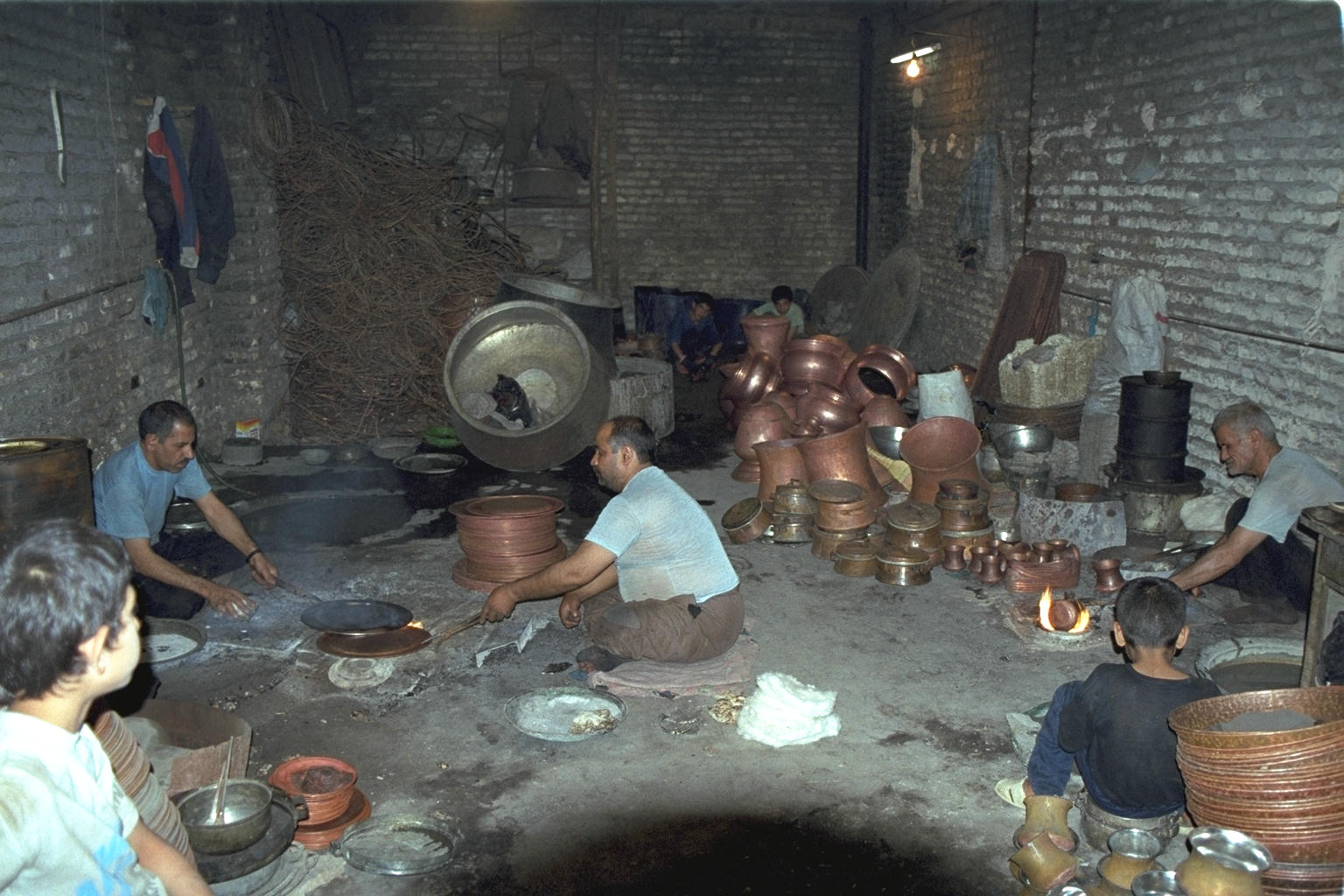
And that is the beauty of such a trip: I get a chance to see things differently; I observe with a different mind. Sometimes it's like a dream, the kind you don't want to wake up from...
I stay in Esfahan for 2 days. The road to the mosk is via a web of streets, which lead to a bazar. I can spend days in such a sheltered market place. There is lots to be seen. I talk a while with a man running a shop by himself: in a space about 100 square feet he has a knitting machine surrounded with heaps of products. "The machine is from Germany", he proudly announces. And he expects me to check out the German sign at the bottom of the machine. And so I do, but my admiration is for the man in his tiny knitting factory. Two doors further there is a printing press. I don't have to crawl under it to see this one is German as well. 'Heidelberg' is the prominently placed brand name. I can't reach the mosk in time, but I don't care. Tomorrow will bring another day.
The next day I go out with my camera. Still I end up in situations which in retrospect would have created a nice picture, _if_ I had the camera handy. But I don't want to be the tourist all the time, and I frequently leave the camera's behind. And again a surprise: the people don't mind to be photographed at all. Willingly they pose for my lens, and so I collect a couple of portraits of the locals in a tea house under the bridge in front of the hotel.
When I finally reach the mosk which is dressed up with many mosaics ("the most beautiful of Iran"), it is closed. I kill some time talking to a merchant about rugs. The next time I visit Iran I will be invited, so I probably won't need the 5-days transit visum.
The mosk is beautiful, and the tiling is fantastic, but such an obligatory visit still bothers me. The best thing about the visit to the mosk actually was the small thunder storm. I vouch to let me get lured in one of those tourist traps only by rare exception.
To go from this beatiful city with its streets with trees on both sides to the transit route to Pakistan is just a small distance. But with my extension to my visum I want to see more. I choose Shiraz as my next destination. It is placed to the south, and to reach it I have to cross a desert. Actually Iran is not very remarkable scenery-wise. The whole country is placed on an elevation, containing a couple of high mountains. The 'valleys' are very wide, and most of the times the mountains are only visible at great distances. The feeling the Negev and the Sinao desert gave me don't surface here - this looks too much like a flat desert with nothing else. The road to Shiraz is monotonous, apart from the descent to the city. This descent follows a river, and it brings diversion in the barren sand patches and stony hills.
I stay in Shariz for 2 days as well, but I don't play the tourist here. I spend my time reading and sleeping. In the evening I meet three people from Poland, someone from the Tzech Republic, and later on an Austrian joins us. We eat together at one of those joints along the road. It is a very bad, greasy, imitation of a hamburger. This food is very popular in Iran, and the travelers on a budget stay alive on this stuff.But I prefer the kebabs and falafel, although I've almost had enough because that is almost all you can get here.
>From Shiraz an exelent road leads me back to the main route. But I want to get closer to the mountains. I spot a road that is possibly unpaved, from Shiraz to Neiriz. I quickly locate this road, and without problems I reach the first village. All the signs point me to the south, but I want to avoid this main road. I start looking around, and locate the gravel road. And it is worth it. While the traffic on the main road is far away in the middle of the valley, I ride in the mountains. The gravel path keeps getting worse, but I have new cases, and they are secured properly. The colors of the mountains are now visible as well: from very deep purple to sandy yellow. I thoroughly enjoy this ride.
In the next village a small piece of tarmac leads to the main road. I go back and find the path. But now it is a lot worse, and I ride too fast. I take a pot hole, the rear wheel lifts up and... I'm being overtaken by one of my side cases, which skids to a stop about 100 feet in front of me. Broken off at the very same point as did the last one! I am very angry - my new case hasn't survived barely 2 weeks! It is my own fault - I ride too fast in rough terrain. At least, too fast for these cases. I put the case back on provisionally, and I return to the main road. That way the case will stand a better chance of staying on the bike.
That afternoon I reach Kerman. It is a middle-sized city with a hotel containing many travelers, because the owner speaks English, and the hotel is reasonable in Western standards. The hotel is booked full with Belgian, Dutch and English tourists. They aren't present yet, but will arrive in the evening with a bus. I'm addressed by 2 people, they have parked their camper on the terrain at the back of the hotel. "Where are you from?", they ask me in English. "I live in Belgium", I answer, as usual. "Well, then we can talk Dutch!" They are from Holland! After such a long time finally something different than crooked English!
We decide to spend the evening together - I tell the surprised hotel owner I'm staying, one way or the other. Maaike and Jan are traveling in a Mercedes camper, with their dog Rex. In Dogabayazit they've taken on Peter from Danmark. Peter was with a group of nine people in a converted coach bus, but the group fell apart when the rumours of war in Iran came through. Peter was the only one who wanted to travel on - the two I saw near Murat would return to Ankara, the others contemplated going to Syria. The hotel owner told me he hadn't received any cancellations, but I was free to sleep on the roof - my favourite spot.
Maaike and Jan are also on their way to Pakistan, their final destination is India. We worry a bit about the stories concerning the desert in Baluchistan (the first part in Pakistan), where the government has little control over the course of things. Drugs are smuggled on a large scale from Afghanistan via Pakistan or Iran to the Arabic Sea, and from there usually to the Western world. The result of all this is that the people aren't very concerned about the law, hence the stories that pop up now and then about travelers being mugged. We decide to travel together in an attempt to head off possible problems.
We decide that Bam will be the first village on our trip, and we plan to spend the next night in the border village of Mirjave. First Jan wants to change the oil of his camper, and I buy a clip for tubes of 2 inches in diameter, and a small drill. I drill a hole below and above the broken-off hook and I fasten the clip, which I have stuck through the case. The result is very good - it isn't easy to detach the case from the bike anymore. I sure hope it isn't necessary, but I decide to take along a few extra clips. They turned out to come in handy in Pakistan.
Again, the road to Bam is one of monotony, apart from the mountain pass at 8000 feet altitude. Allah must have heard me complain over His landscape, at the summit of the pass we are greeted by a fresh spot of rain. Five minutes after I retrieved my protective suit and put it on, the rain stops. After the descent the temperature quickly rises to 36 degrees Celsius, and I'm still wearing my protective suit. In Bam we look for the Bam Inn. With the help of a friendly motor escorte we locate the place, but meanwhile we meet a man on a bicycle with blond hair. No luggage, but obviously not a native. His name is Pascal, he is from Holland, and according to him we would be far better off staying with mister Akbar.
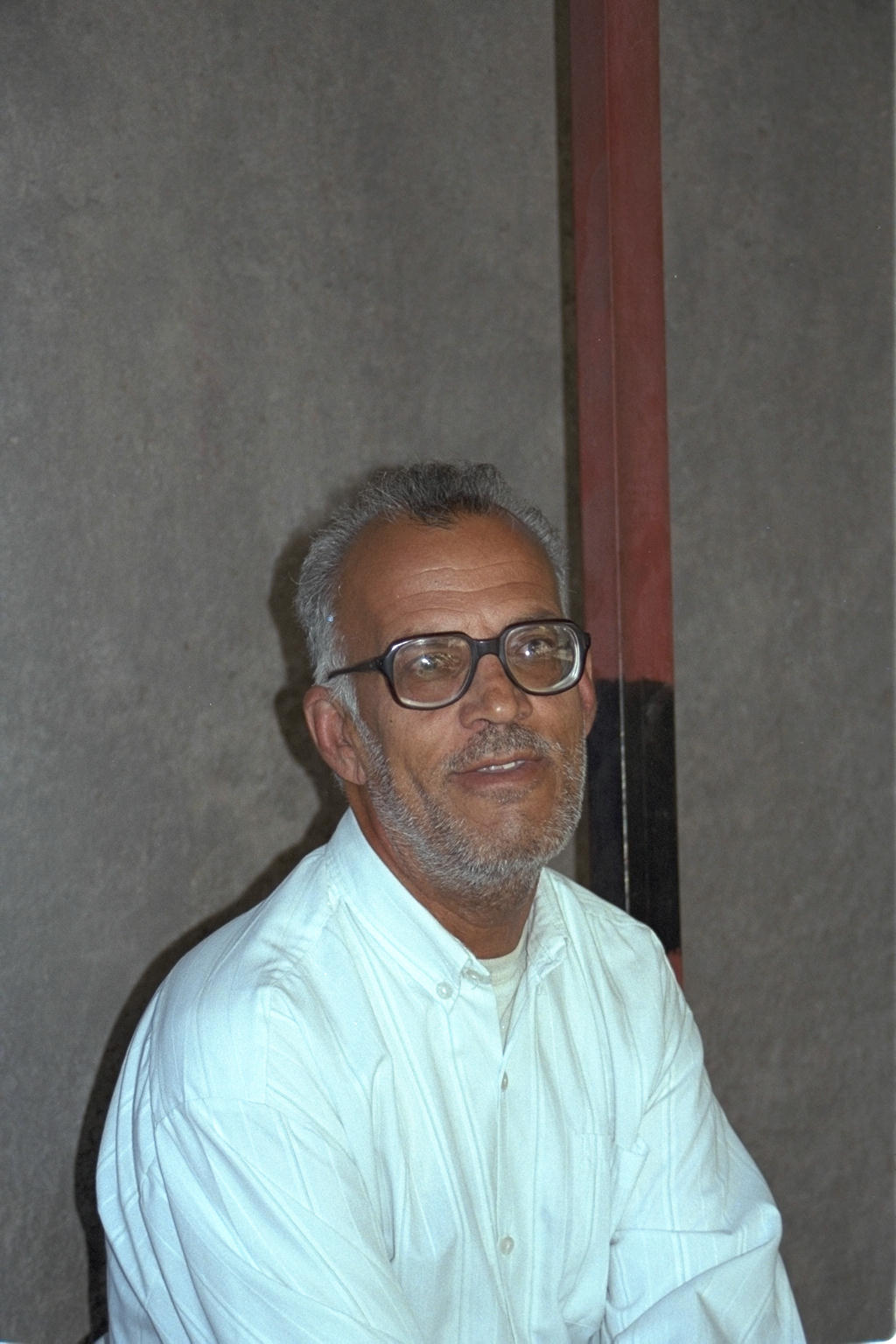
"Tourist guesthouse Akbar" is a simple guesthouse with rooms which aren't actually used, for everybody takes the matrasses outside to sleep under the stars. Mister Akbar, a retired English teacher, doesn't allow Iranians to stay. The walled garden, filled with palms, is a private garden where people who are in the Iranian sense 'strangers' are not permitted. All foreigners get acquainted very quickly and hence they aren't strangers for eachother. A private garden is one of the very few places in Iran where women are not required to wear chadors. Maaike and Lieve (from Belgium) like this rule - they remove their chador. Lieve travels with Peter, with public transport, to India. They too want to climb the Karakoram and hike for a few days.
Mister Akbar is one of a kind. He has traveled himself, and knows from experience what travelers need. There are chairs in the shade, he serves (free) tea as much as needed. The meals are simple - there is no menu. Mrs. Akbar cooks traditional Iranian meals not served in restaurants.
Because our group is rather large (Peter and Lieve from Belgium, Matthew and Aaron from Australia, Pascal, Maaike and Jan from Holland, Peter from Danmark and two people from Japan), we don't eat at the table. Instead we sit on the floor, the table cloth is spread out. The plates and cutlery is a mishmesh, but no one really cares. The washing machine is in constant operation.
Mister Akbar started this for 2 years, and already the other hotels in Bam complain they don't see any foreigners anymore.
I thoroughly enjoy the late lunch, specially prepared for us (chicken and rice), as well as dinner (lambs meat, potatoes, egg plant and rice). But later that evening my stomach acts up - I hardly sleep during the night. Apparently the tap water in the hotel in Kerman wasn't of the quality the owner said it was. I drank one liter, and during the night I get very ill. I start the next day with throwing up, and my body tries feverishly to expell the stuff through other ways as well. I run a high fever, and I'm glad the others decide to visit the castle of Bam. I go to sleep, and luckily I recuperate a bit. But having a successive dinner is out of the question. We had made plans to leave the next day... I take one of Carolyn's aspirines and sleep all night. The next day I start off with some yoghurt, that seems to go well. I still feel very weak, but I resume the trip anyway.
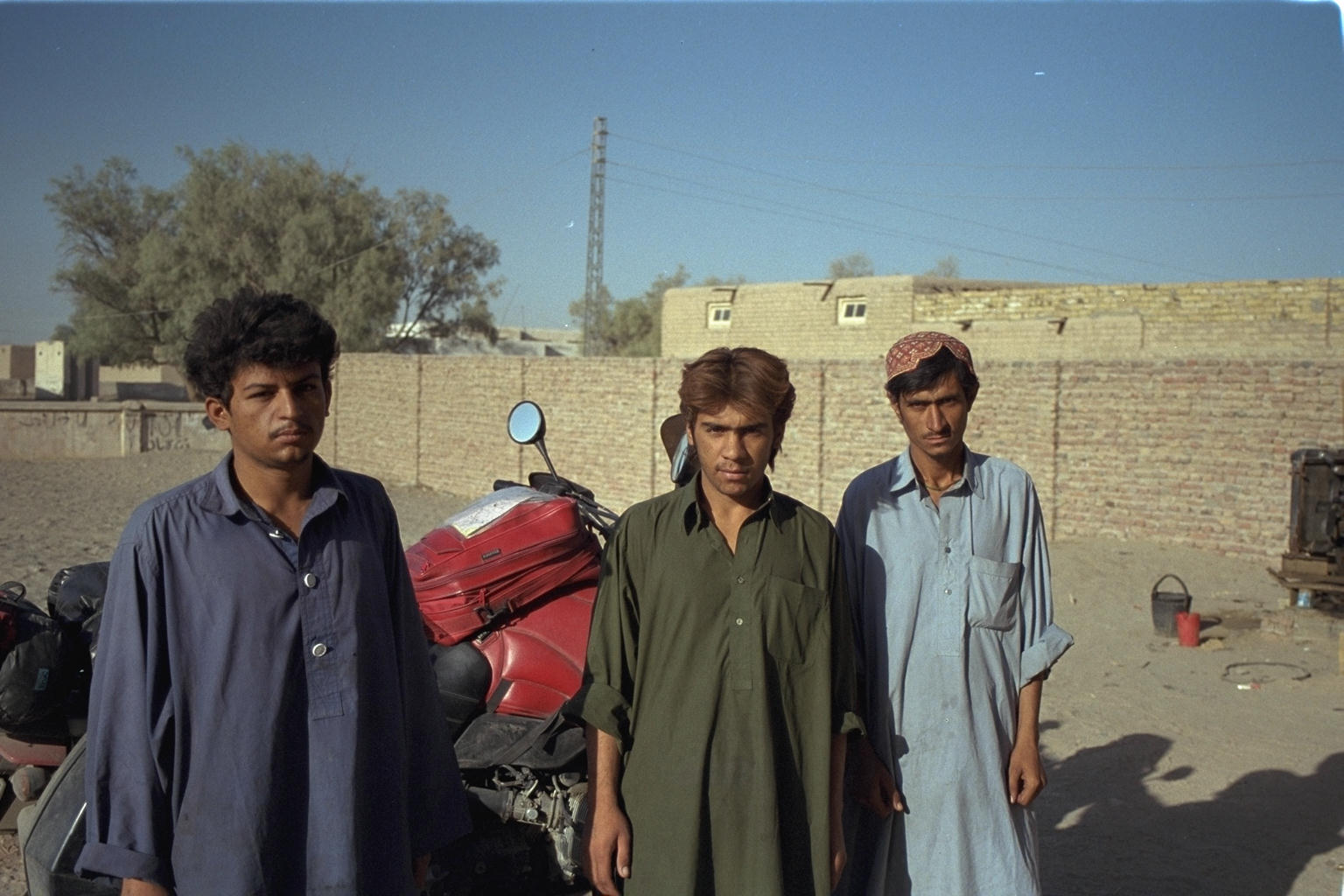
In Mirjave, the village on the border with Pakistan, we notice how poorly the people live. And they notice us as well: everywhere we stop large masses accumulate, mainly extremely pesky kids. Maaike feels very ill at ease with all this attention. I come up with a new strategy to keep the kids away from the bike: the first one who tries gets a mouth full, the next a smack on the head. This seems to work well, until I enter a shop to buy some yoghurt. They discover the button for the horn, and soon every kid has to try it. I chase one of the kids - to outrun me he leaves behind his slippers. Later on I return them, after everyone has understood to stay clear of the red bike.
We tour around some more in this village, and see the goats eating off the garbage that has collected on the corners of the streets. A shepherd drives his flock through the main street - in the middle of the village we stand amidst a amss of walking wool. The men in the tea house abandon their conversation, people stare after us for a long time. Some kids extend their left hand while pointing at the palm with their right hand. They are begging.
We clearly are the very rich strangers, and we feel a bit threatened. Maaike and Jan are concerned about finding a safe place to stay the night. After a lengthy negotiation with the only (fenced) hotel in the village I take a room and Jan and Maaike are allowed to park their camper. It is very expensive in Iranina terms: twenty dollars, to be paid in cash. Iran cannot stand the United States, but the dollars meanwhile provide for a complete secundairy money flow. The government forces some hotels to charge in dollars when foreigners are visiting. Iran causes extreme poverty amongst its population, it forces a religion, but demands those despicable dollars from the tourists. Hypocrisy ultima forma.
Crossing the border on the Iran side is strenuous. We get sent back and forth between buildings without names on them. Each time we ask for directions for the next action after another bureaucratic action the reply is the same waiving gesture. Like we are a couple of flies on the meat at the butcher's. Slowly we work ourselves through the about seven steps it takes to leave this country.
At the Pakistani side we are the meat, and the money exchangers the flies: we ar swamped with men wanting to buy dollars against the current black market rates. They do so right under the noses of the gentlemen of immigrations, who also want our attention because we have to be registered. Apparently exchanging money on the black market is an accepted activity here. The long line of Pakistani waiting will have to wait a bit longer - the immigration service registers us first, despite the protests of the people in line. For the second phase we have to go to another building. I notice there is no road connecting the buildings, but just a sand path. The noman's land is inhabited - there are some shabby huts with smoke coming out. Kids play outside.
Arriving in the building for the second round we are offered a seat in a totally worn-out lazy chair. We wait. After I've observed the paper-reading, coffee-drinking men for 5 minutes, I ask them what we are waiting for. "The officer", they answer. "How long will that take? It is warm, we would rather be on our way, and we don't have coffee, like you." "This is tea with milk - not coffee. The officer is doing something else now, it will take 15 minutes. Do you want some tea as well?" We sure do, and we talk a bit with these men. One snaps his fingers to order tea with boiled milk, another one orders some young men hanging around to start copying down our carnets. The immaculately well groomed reader in his bright white traditional clothing speaks English very well. He explains to us it is Sunday, and that the officer is now being picked up from home because actually he had a day off. Me with my big mouth...
The ride through the desert goes without a hitch. The road is in good shape, and there is little traffic, which allows me to slowly get used to riding on the wrong side of the road. (Actually, I have to say 'left side', but for now it feels like 'wrong side'. It'll probably takes just some getting used to.) The trucks form a pretty sight - the loading bays are completely dressed up with colorful paintings. The fenders have chains with bells, and everywhere there are lights and reflectors. The edges of the windshields are decorated as well, although that severely limits the view of the driver. Every now and then we are overtaken by a pickup fully loaded with jerrycans: Iran 'exports' this cheap gasoline to Pakistan as well. The checkpointsat which we have to register ourselves are irritating. We have to write it down ourselves, the military personel only speaks, reads and writes Urdu. I discover the Australian couple in their Audi 100 are ahead of us, but Gerard and Laura haven't passed here yet.
After nearly riding a big dent in both wheels for the umptieth time on one of those ribs on the road at a checkpoint, and the fact that we now have to wait as well, makes me restless. After a while Jan and I are escorted into an officer's mess which comes right out of a movie about the colonial times. Big ceiling fans, blue, clean luxury chairs with a white knitted cloth where you rest your head, low tables and dimmed lights. We are offered a chair and we wait what'll be their next move. An officer comes in, he speaks English flawlessly. He exchanges some polite words, but then gets to the point: "Did you observe any military activities along the Iranina border? How many soldiers have you seen in Mirjave? Are there troop movements along the roads?" This man wants military info - I tell him what I've seen (which isn't much: a group of 12 armoured vehicles at Mirjave, and many soldiers at the barracks in Mirjave). Apparently Iran and Pakistan aren't on the best of terms anymore...
The dangerous area in the south of Pakistan stops at the city of Quetta. We are halfway there, in Dalbandin, when we have only 2 hours of daylight left. We decide to stop at the only hotel in town, because we wouldn't make it to Quetta, and we brace ourselves for the undoubtedly difficult reception of us foreigners. Very friendly shaking my hand I'm shown my room, which looks acceptable, the bus can be parked behind the hotel, the curious people are chased away. "Do you have a place for my bike?" "Sure! Follow me." The doors of the restaurant open, four tables and chairs are evacuated, and I ride inside, through the restaurant, to the back door, into the hallway. The best spot ever - apart from the time it stood in my own living room. The stories other travelers tell us about hostility obviously don't apply to us.
We enter the village on foot and I gasp for air. The first impression is overpowering, but also very smoky. There is no pavement - the main street is a sand path. Dirty used water runs through a sort of canal dug alongside the path. In some places the canal isn't deep enough, the water flows over the path itself, transforming in some kind of sewer mud. The path is lined with shops, tea houses, handcraft stores and we end up in a bakery. The bread is flat like a pancake, baked without yeast. In the Middle East bread is baked by putting it on top of a curved plate with a gas flame underneath.
Here the baker sits besides a hole in the ground. This is the top of an oven formed like a classic bee hive: widest at the base, narrowing towards the top. At the bottom of the oven there is a wood fire. The baker prepares the dough and flattens it on a kind of hard pillow which is kept damp. With a firm slap he sticks the bread against the inner wall of the oven. When the bread almost comes loose it is done, and with a long stick he expertly fishes it off the wall and slings it on a stack.Because we're watching him he tries to do this even craftier, and immediately he looses one loaf which lands in the flames.
People all wear the traditional Pakistan outfit: very wide trousers made of light cotton cloth (shalwar) under some kind of shirt which reaches to below the knees (qamiz). It looks very comfortable, and even more so when you are wearing black jeans yourself. On the spot I decide I need one of those outfits myself. It would take some time before I have one to my liking... The sparse woman we get to see is completely covered by her chador: only her eyes are visible. Later we see they are more orthodox than in the rest of this country.
Again we are stopped, this time by someone wearing a shalwar qamiz made of very nice cotton, a golden watch and a couple of rings. The man speaks English reasonably well, and we are invited for some tea. We ask for tea without milk, and we get green tea which still tastes slightly of milk because the tea pot wasn't clean. We have the usual conversation and I learn that a shalwar qamiz in my size will be difficult. One has to be tailor made. I decide to give it a shot in Quetta.
The road to Quetta is bad. No, 'bad' isn't the word. It is under construction, and some stretches are finished and very good. But in Pakistan everything is different. I think it's normal to prepare a road in its entirety, and then have it asphalted in one go. Not here. One stretch of the road is old, a paved sand path totally cracked by the overloaded trucks, the next piece is elevated and 'hardened' with egalised gravel which is demolished already by the traffic, and the next stretch only has the concrete constructions for draining the rain water under the road. Here there is no road, just a sandy track besides the planned road. What's next only Allah knows - it can be either of the three choices, or something in between. I don't see any logic in the road construction in Pakistan.
Due to this you cannot imagine how the final result will be, or how long the trip will take. The few hundreds of miles to Quetta takes a full day. That in itself isn't a problem, but the psychology of the Pakistani road will be a fair opponent to my good nature.
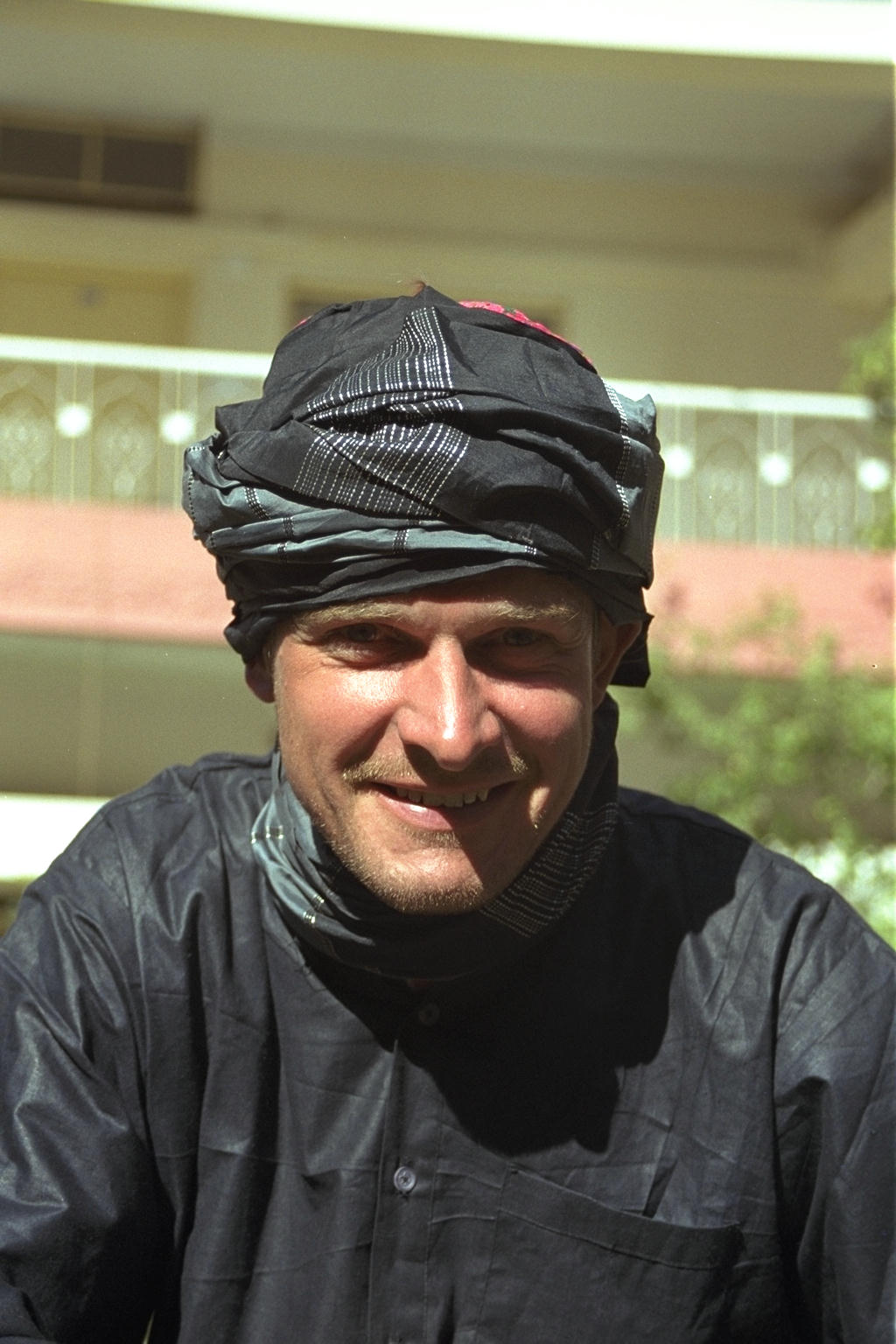
25 miles before we enter the village I notice a sign: Hotel Bloom Star - "Camping on green lawn". I don't know what to think of it, but it sounds very attractive. There we encounter Peter and Lieve, in the company of Pascal. My hotel room is very damp. The next day I decide to place my tent on the grass on the patio of the hotel - incredible luxury after all the desert dust I've experienced. And Aaron too pops up, Peter from Danmark leaves by train for Islamabad (together with Peter and Lieve). Aaron takes Peter's place in the camper, Jan and Maaike decide to take the easy southern route to Islamabad. Pascal leaves at 8 AM to Loralai via the more difficult inland roads, and I decide to follow him. Pascal and I agree to meet that night in Loralai (80 miles away).
I depart at 12:30, after calling Sandra from the post office to deliver my bi-weekly life sign. I end up on a road which is even worse than the one I rode coming into Quetta. This road keeps going south - everyone I ask where this road leads to looks at me with pity. I decide to go back, this can't possibly be the road to Loralai. At 14:00 I'm back in Quetta, and decide to take the through road in an attempt to keep my promise of arriving in Loralai in time.
This road is clogged with trucks and just one track wide. And this is the main road! Every oncoming vehicle plays a chicken race: you drive head-on towards eachother, and the one with the least courage (or death wish) brakes and ends up on the shoulder of the road. In the beginning I keep loosing, but then again I don't want to die under one of those colorful coach buses. I don't make good time - I reach Loralai just before sunset. I charter a police officer who gets on the back on my bike and we check the four hotels in the village. Pascal hasn't arrived yet. I check about the route we were supposed to take, and they assure me it is _impossible_ to reach Loralai in one day on a bike. I eat (without the company of Pascal) a traditional dish: Chicken Korma: chicken with lots of spicy curry. Very nice. There aren't that many foreigners in Lorelai, judging by the attention my appearance receives.
The scenery still is desert-like, and not very attractive. From the main road I have taken a mountain pass to Loralai, but I sure could do with some green. Ever since Gankiri in Turkey I have only admired the dust of deserts.
Meanwhile I know I don't have to count on making some set distance in one day because the roads are too unpredictable. Furthermore I have to wade through some river eleven times to reach the Indus valley, according to a returning German. This information proves to be correct, but the rivers are almost dry. Nothing spectacular, unfortunately. When I close in on the Indus, there is a nasty surprise waiting for me in one mountain pass.
The mountain pass climbs steeply, the track which barely supports a truck is completely demolished. The shoulders are some 6 inches lower than the crushed asphalt, and the climbing trucks sure don't bother making room for such a small bike. One of these trucks comes barging down the road and cannot break to avoid a collision. I make myself as small as possible, and I barely miss his rear tyre, while staying on the asphalt by a hair. But a second, nicely decorated truck follows. He hadn't seen me at all yet, and a crash is inevitable. I'm laying off the road, the bike has fallen on the shoulder. Luckily I'm alright, but the righthand case has been knocked off the bike. Not until some time I see that the lefthand case lid is torn and that its support has been damaged. I shout some curses to the truck, and get out a strap to secure the case to the bike.
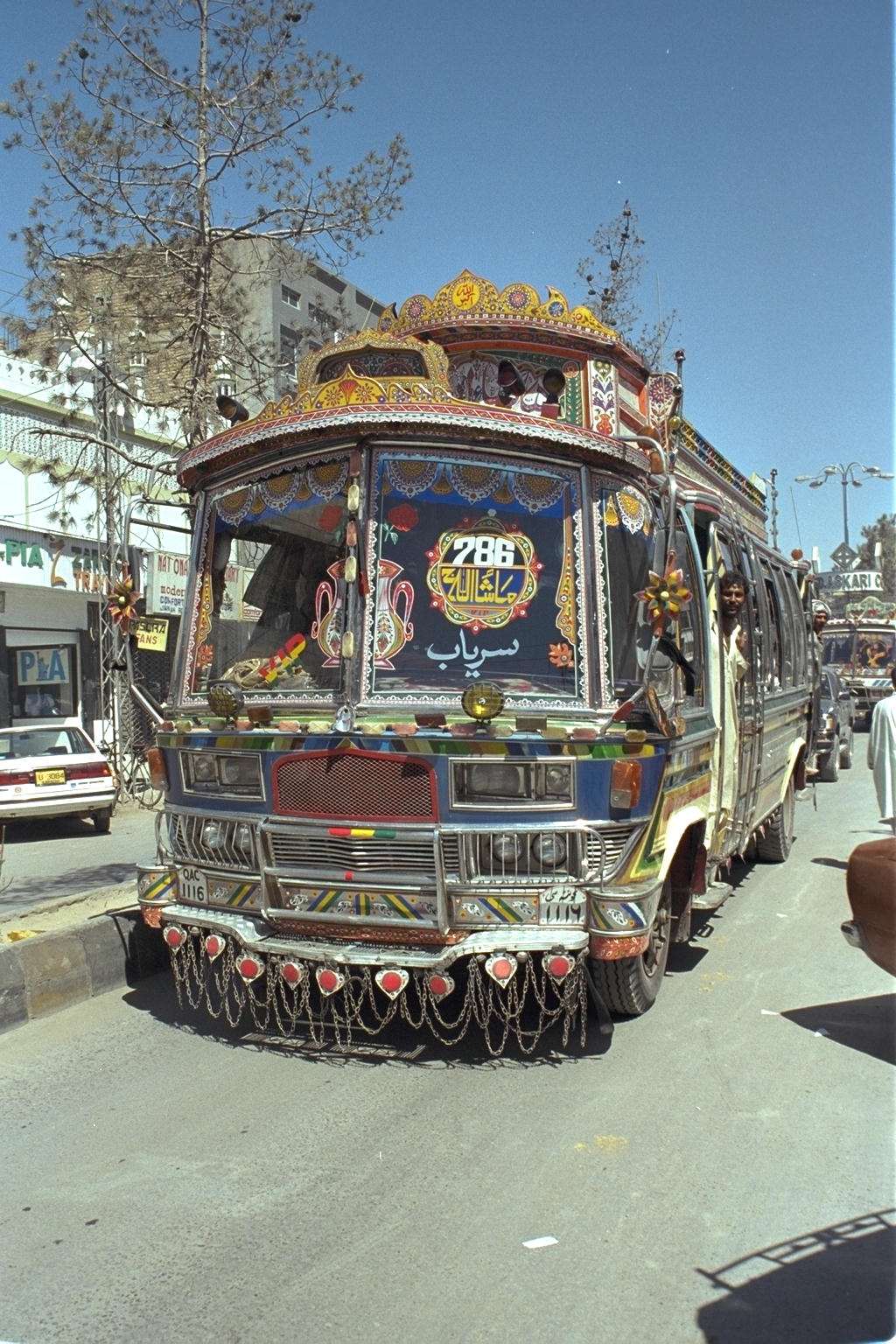
After arriving in Multan I search for a place to sleep. I get another escorte from someone on a moped, we cross the entire city. He brings me to the Holiday Inn, thinking tourists always sleep in those places. I say goodbye to my escorte and plan on looking for another hotel. But then I get a vision of a filled bath and decide to stay at the Holiday Inn. First I repair the damage to the case - and spend half an hour finding my drill! But then it is quickly fixed: the other case is now securely fastened to the bike.
The Karakoram Highway is due north from Multan, and follows the Indus. I ignore the advice of the desk clerk, I don't go via Lahore to Islamabad, but I want to follow the Indus. This is a psychological torture. The road along the Indus is 170 miles long. The first 25 miles are brand new asphalt and I make excelent time. But then the road constructions begin: a random sequence of deep sand, gravel paths, crushed asphalt and a few new stretches. Sometimes the average speed drops to 15 mph, and at those moments I start to doubt whether I will conquer the 120 miles that remain. And then things improve and I think I'll make it. Just when I have built up confidence I'm again directed into the deep sand next to the road...
Building roads is a very work-intense business. To build a quality road one has to lay a solid foundation which gives the road its stability. Big trucks deliver rocks which are chopped to pieces by the workers. With a basket on their heads the gravel is dumped and another shift of men spread it out. Every 10 metres they erect a barricade to keep the traffic off the road. When a stretch is finished, a roller arrives which presses the gravel in its place. Then the barricades are removed, and the new road is immediately filled with trucks (and subsequently crushed to bits). To finish the work a machine is put to work to lay the asphalt. With a shovel and pickaxe the shoulders are finished. I try to calculate the amount of gravel that has to be chopped to size in a stretch of one meter height and a kilometer long, and how long it takes the men to chop the gravel in the soaring sun. I fail to find the answer...
I reach the village of Talagang about 60 miles from Islamabad just before sunset. In a restaurant a hotel room is improvised by means of a rope bed. Everywhere in Pakistan there are wooden frames of beds which are covered with networks of ropes. En route to Multan they were placed in an open restaurant, and I shared such a bed with 3 other guys which were having their meal on it. People sometimes put one of them up next to the road to take a nap. And I have the dubious honor of spending the night on one of those. A rope bed is too flabby by definition: you always lie in a hollow. Very uncomfortable for someone who sleeps on his stomach.
Next morning I reach Islamabad in a short time. It is a strange city - no city centre. It is designed about 30 years ago, and built according to that plan. The city has square blocks which are numbered, and each block has its own function. Every block has its own market, or centre, where the activity is concentrated. In the eastern part of the city the government buildings are situated. This is a comfortable city, with lots of green growth. I start looking for the camp site, and encounter a couple of hippies and a man sermoning a tree (or so it seems). I check the guest book, and see that Peter and Lieve, together with Peter from Danmark, have left yesterday. I leave the camp site and check into a luxury hotel with air conditioning and a bath.
The next day I spend reading the book I bought in Quetta. The following day (Monday) I want to go to the Chinese ambassy to see whether there is some other way of entering China with my bike and all. The bike won't start - the start motor makes a coughing sound. I take out the start motor, but don't see anything out of the ordinary. It seems to work properly. I try again, and now I see the fat bundle of cables smoking!
Quickly I shut everything off, and look for the obvious shortout. I locate it in the cable leading to the switch for the side stand: taken apart by Lejeune in Bastogne, and pushed back in its housing too roughly. The Pakistan road did the rest: the cable has worn through and causes the shortout. I take the switch apart, force closed the connectore and... the engine still doesn't start, the battery is almost flat. With the aid of some men we push the bike until it starts and I'm off to the ambassy.
Of course, the ambassy is already closed. I try the Dutch diplomatic mission first then, and helpfully they write a letter for me stating what I want and why. The battery of the bike hasn't been charged enough to start - I'm taking the bike for a long ride. But it appears that part has crumbled under the tortures put to it. I need a new battery. Again I call Menno. He was prepared to send the parts I demolished this time to Islamabad - I ask him to include a new switch, a case lid, case supports and such. Shipping a battery is not possible due to the acid it contains: my assignment for Tuesday is finding myself a new battery.
Matthew (from Australia), whom I met again last Saturday in the Internet cafe, Peter and I have agreed upon taking breakfast at the Holiday Inn in Islamabad - rumour goes they serve croissants and Danish butter there. At 8:45 AM I ride to the camp site to pick up Matthew, and run into a bike. It is the Africa Twin of Harmen and Nathalie.
We introduce ourselves, and stay talking way too long - the dtae at 9 AM in the Holiday Inn won't work. I drop off Matthew at the hotel at 10 AM, but I myself skip breakfast. I go back to the Chinese. They refuse to give me a visum if I go in with my own transportation. I can only enter by 'public bus'.
I have to have a 19 Ah battery, but all I can find is a 15 Ah one. I decide to buy that one instead, although now the ABS system won't start. I can trick it to start anyway by shutting the engine while riding, and then starting it again without using the start motor. I hope there is no other damage in the bundle of cables, it's impossible for me to take it completely apart.
Returning to the camp site we are complete again: Maaike, Jan and Aaron have arrived as well. Harmen, Nathalie and I want to take a road which actually isn't suitable for motor bikes: from Gilgit to Chitral, high up in the mountains, 200 miles off-road along spectacular canyons and over high passes. We're confident to take on this trip with the three of us on two bikes, not alone. Together we will ride the Karakoram, but not until Harmen has liberated his new rear tyre from the claws of the customs. He succeeds in doing that on Thursday - at night we put it on his bike together. We would have gone Friday, if Harmen wouldn't have gotten ill...
By the way, sponsoring is popular amongst the Dutch travelers: Rex (the dog of Jan and Maaike) has gotten its food for the complete journey (90 kilo) from Pedigree Pal. Nathalie and Harmen ride on Bridgestone tyres which have been provided by Bridgestone. They also have a deal with the outdoors sports shop Van Herwijnen in Zoetermeer for a good part of their equipment.
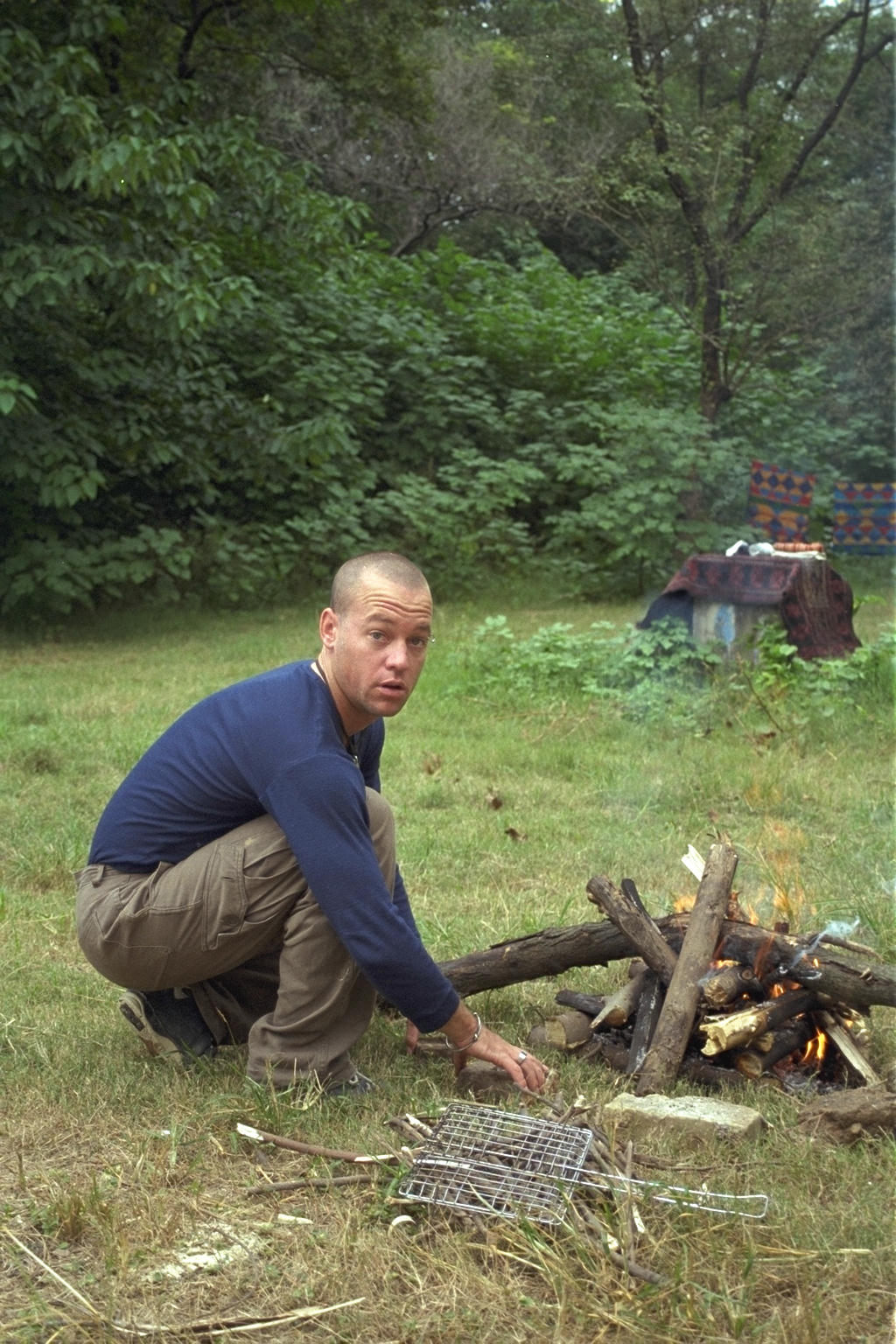
Being with such a large group (current count stands at eight world travelers) is comfortable - we decide to make sajj. Sajj is a dish from Baluchistan we had in Quetta: you build yourself a big fire, you take a couple of sheep legs on a metal pin, stick that in the ground around the fire, and wait a couple of hours. Aaron and I did the shopping - a couple of rear legs were removed from a sheep body hanging outside a butcher's. We had to point out the chicken we wanted. Nothing special, you would think - but these chicken were still alive! One died, and the butcher assured us the sheep legs were just as fresh. It had to be, because this butcher lacks any form of cooling, there isn't even a front door in the shop.
On our way to the Kaghan valley, next morning, the sky gets all clouded over as soon as we reach the mountains. Luckily it isn't so warm, and here on the border with Punjab and the mountains everything is lushously green. We want to go to Karan via Muzzafarabad, but we didn't pay attention to the fact that we had to cross the border with Kashmir. After a beautiful pass (not very high, 5500 feet) we arrive at a police office. Usually I ignore them, but this time they blew their whistles very loudly behind me. I turn around, and they tell me we cannot continue. We are at the border of a part of Kashmir which is under control of India (repressed by India, the Pakistani say). Even when I locate the boss, and let him call his boss, they don't make any exceptions. We ride the beautiful pass again, in reverse direction.